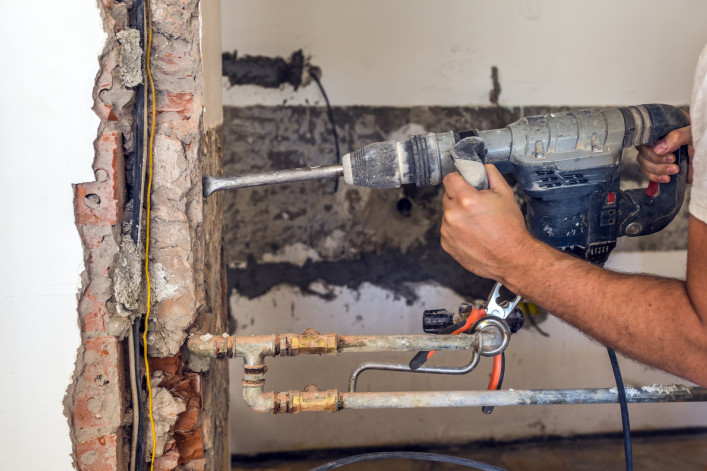How do I get access to my neighbor's condo to do repairs?

iStock
I need to get access to my neighbor's apartment to repair an issue affecting my place. I'm in a condo building. What do I need to know?
Whether you're in a co-op or condo, this should be fairly straightforward, but a lot depends on a handful of variables, according to Ian Brandt, a partner at the law firm Wagner Berkow, which represents many co-op and condo owners and boards and is a Brick Underground sponsor. One is the building's rules.
Buildings usually allow access, but the work has to adhere to the same rules as any other construction
"There is generally a right of access in condo declarations and bylaws and in proprietary leases allowing the co-op or condo to access an apartment for repairs, but I've never seen a co-op where shareholders can access another shareholder’s apartment to do work,” Brandt says. “Condominium bylaws, however, often provide for an easement allowing unit owners access to other units or adjacent common elements to perform repairs."
For example, Brandt says, “Say there's a plumbing problem in an apartment. There's a right of access where the board can get access and fix the problem and charge the unit owner for the work, usually upon ‘reasonable’ notice, which may be as much as 30 days’ notice or shorter if exigent circumstances require."
With rare exceptions, an apartment owner will require the consent of a neighbor if the owner wants to enter the neighbor’s apartment to do work.
Assuming you have the consent of the neighbor/owner and the board, doing the work should be fairly straightforward. Note, however, that you'll still have to adhere to all the other city and building rules around renovations. So if it's a significant enough job to require permits, you'll need to hire an architect and file plans with the city. Similarly, you'll have to abide by building rules that limit construction jobs to certain hours and certain durations. Brandt, for instance, lives in a condo building that requires owners to wrap up jobs within 120 days.
First thing's first, though: When considering a job that requires going through a neighbor's apartment, look at the building's governing documents to figure out what sort of access you have a right to, and then ask your neighbor.
You can still get access for certain essential work if your neighbor is resistant, but it'll take some doing
If your neighbor doesn't want to let your workers in, you'll have to call up a lawyer. But don't expect to get very far if the work you want done is cosmetic, as opposed to essential to the habitability of your apartment. There are laws that could require an adjacent apartment owner to give access, if the repair is legally necessary.
"Without cooperation, litigation is the only way you can do it," Brandt says. "Usually there'll be an injunction for access to make a repair. But usually, the only way a court's going to [issue that order] is if it's required by law or it's an emergency, but not if the neighbor wants to do something temporary or elective."
In some cases—for example, an upstairs neighbor has a crack in his bathroom tile that's allowing water into someone's ceiling—the court will first order the upstairs neighbor to fix it quickly, and if that doesn't happen within a short time period, order him to provide access to workers who will.
In extreme cases, a judge could order that workers come in accompanied by marshals.
Neighbors who get upset about renovations after they're done may also sue
Sometimes after a neighbor has provided access and the job is done, she will get upset about the result and sue to have it reversed.
For example, Brandt says, a new trap for a toilet may extend down closer to the downstairs neighbor's ceiling than the previous one. How far it can extend should be covered by the easement laid out in the condo’s declaration or bylaws, but even if the new one is a little over the line, it may be allowable.
"The Department of Buildings is going to stop work if it's dangerous or it doesn't conform to plans," Brandt says. "Then, when it's done, there's the question of whether a court will allow it to be moved or removed, or whether the person whose apartment it intrudes into is entitled to damages. Sometimes the courts won't award damages because they consider the impact de minimis. They decide it's not worth damages."
In other words, even if the trap sticks out an inch or two beyond where it's supposed to under the easement, a judge may decide it's not a big enough deal for you to have to pay your neighbor for. These questions usually come into play in retrospect, Brandt says.
"Usually what happens is people complain after," he says. "They do the work and neighbors complain after. I've never seen something where people were able to get an injunction and shut it down."
If you're blocking your building from doing required work, expect to be forced to let workers in
For work that's required, such as balcony and facade inspections and repairs mandated under Local Law 11, apartment owners can't block access. If they do, Brandt says, "Then the board is going to go get the court order and the judge is going to give it to them, if it’s an imminent need to prevent a dangerous condition."
The common rule of thumb here, as in most co-op and condo legal issues, is to try to be reasonable with the board and your neighbors, so that it doesn't get to the point of having to appear in court and pay attorneys by the hour. But if it does, it's hugely helpful to know what your rights are.
Ian Brandt is a partner at the New York City real estate firm Wagner, Berkow & Brandt. To submit a question for this column, click here. To arrange a free 15-minute telephone consultation, send Ian an email or call 646-780-7272.
You Might Also Like





























